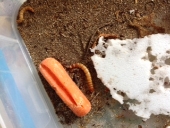
 4
4




 3
3




What I'm asking for, is more information (and in my wildest dreams, case studies) about practical setups for taking advantage of some of these amazing organisms' ability to break down petrochemicals.
 3
3




Invasive plants are Earth's way of insisting we notice her medicines. Stephen Herrod Buhner
Everyone learns what works by learning what doesn't work. Stephen Herrod Buhner
 2
2








Leah Mack wrote:I think one of the limiting factors is that meal worms (and super worms) aren't great at breaking down mixed food scraps. My understanding is that they need much drier conditions than you tend to get when you're using kitchen waste. ...?
Invasive plants are Earth's way of insisting we notice her medicines. Stephen Herrod Buhner
Everyone learns what works by learning what doesn't work. Stephen Herrod Buhner
 4
4




Anne Miller wrote:
How much plastic do you have in your food scrapes?
Maybe the solution is to separate the food scrapes from the plastic in you kitchen waste then maybe have two bins one labeled plastic and one label food waste or just give the food waste to the chickens...
 1
1




Invasive plants are Earth's way of insisting we notice her medicines. Stephen Herrod Buhner
Everyone learns what works by learning what doesn't work. Stephen Herrod Buhner
 3
3




Most large community compost systems accept yard waste.Anne Miller wrote: It might be easier to get industry standards changed to get plastic out of the food business.
Visit Redhawk's soil series: https://permies.com/wiki/redhawk-soil
How permies.com works: https://permies.com/wiki/34193/permies-works-links-threads
 1
1




Jay Angler wrote:
This is a big problem with community compost projects all over. We *need* yard waste composted rather than landfilled. It should be a resource rather than a liability, but I don't see any practical way to ensure that it's plastic free.
If we can find some sort of secondary processing with microbes/insects/fungi either on an individual or community level, that would be a good thing.






 1
1




Life on a farm is a school of patience; you can't hurry the crops or make an ox in two days.
Henri Alain

|
I promise I will be the best, most loyal friend ever! All for this tiny ad:
Rocket Mass Heater Resources Wiki
https://permies.com/w/rmh-resources
|

